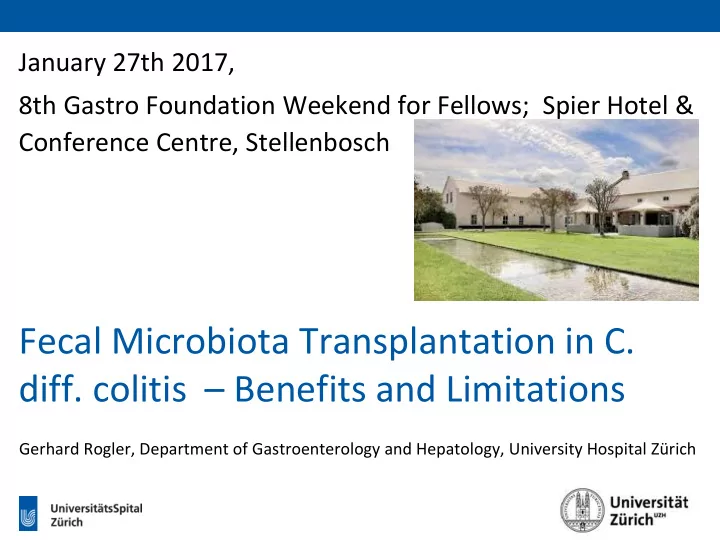

January 27th 2017, 8th Gastro Foundation Weekend for Fellows; Spier Hotel & Conference Centre, Stellenbosch Fecal Microbiota Transplantation in C. diff. colitis – Benefits and Limitations Gerhard Rogler, Department of Gastroenterology and Hepatology, University Hospital Zürich
Case 28 year old mother of a two year old daughter 4/2013 Cystitis: Therapy with Amoxicillin/Clavulanic acid • 5/2013 Diarrhea; Clostridium difficile toxin positive; Therapy with metronidazole for 2 weeks • 6/2013 again diarrhea; Clostridium difficile toxin positive; Therapy with vancomycine orally • 7/2013 again Diarrhea; C. diff toxin negative weight loss of 10 kg; unable to work; unable to care for the daughter 1
Is administration of probiotics useful when giving antibiotics? antibiotics-associated diarrhea Probiotic Control P value* Diarrhoea Yes 7 (12%) 19 (34%) 0.007 No 50 (88%) 37 (66%) No of patients 57 56 C difficile toxin Positive 0 9 (17%) 0.001 Negative 56 (100%) 44 (83%) No of patients 56 53 *Fisher's exact test. 22/135 patients lost to follow-up or withdrew. 4/113 patients not tested for C difficile . Hickson, M. et al. BMJ 2007;335:80
C. diff colitis – clinical impact most frequent form of hospital-acquired diarrhea 1 • • costs: > 1.000.000.000 $ per year in the US 2 • toxin A: enterotoxin; permeability, secretion ↑ • toxin B: cytotoxin; inflammation • new, more virulent strains (BI/NAP1/027 & Co.), quinolon-resistance, gene-deletion: toxin-production ↑ 3 • US numbers 2008 – mortality: 6x more deaths as compared to all other enteropathogens together • increasing number of cases without antibiotic pre-treatment • risk factors: age, co- morbidity, immunosuppression….. 1. Lipp MJ, J Gastroenterol Hep. 2012 2. Lipp MJ, J Clin Gastroentol. Hepatol. 2012 3. O‘Connor JR; Gastroenterology 2009
Relapsing C. diff. Infection (rCDI) • suggested definition: recurrence of symptoms within 8 weeks after succesful antibiotic therapie 1 • clinical definition: no repeated C. diff. Assay necessary • recurrence – how frequent? • „only“ around 10-30%... • …BUT if 1x relapse 40-60% (up to 65%) further relapses 2,3 1. Cohen SH;Inf. Contr. Hosp. Epidem. 2010 2. Kelly CP,; NEJM 2008 3. McFarland LV, JAMA 1994
Therapy Recommendations - C. diff Colitis
FMT in C. diff. colitis - Evidence • Power calculation: randomisation of at least 118 Pat. • Inclusion criteria: • - a relapse after at least one course of adequate antibiotic therapy (≥10 days of vancomycin at a dose of ≥125 mg four times per day or ≥10 days of metronidazole at a dose of 500 mg three times per day). • - diarrhea and a positive stool test for C. difficile toxin. 2. Van Nood E; NEJM 2013
FMT - Procedure • 30g of feces are sufficient!
FMT - Procedure • and then….? vs. vs. Trend in favor for lower GI route? – success 91.4% vs. 82.3% 1 1. Kassam Z ; Am J Gastro 2013
FMT - Procedure
Case 28 year old mother of a two year old daughter • 4/2013 Cystitis: Therapy with Amoxicillin/Clavulanic acid • 5/2013 Diarrhea; Clostridium difficile toxin positive; Therapy with metronidazole for 2 weeks • 6/2013 again diarrhea; Clostridium difficile toxin positive; Therapy with vancomycine orally • 7/2013 again diarrhea; C. diff toxin negative • weight loss of 10 kg; unable to work; unable to care for the daughter 8/2013; FMT regained 8 kg of weight, fully working (writes nice e-mails every Christmas) 10
Comparable success rates (~85%) 11 JAMA 2016
FMT: Adverse events FMT associated SAE are rare
FMT: open questions • Standardization • Inclusion criteria for recipient and donor • Costs • Patient acceptance • Risks (disease transmission, long-term effects) • Fresh stool/frozen stool (open biome) • Filtered supernatant may do it
FMT: open questions • Standardization • Inclusion criteria for recipient and donor • Costs • Patient acceptance • Risks (disease transmission, long-term effects) • Fresh stool/frozen stool (open biome) • Filtered supernatant may do it “Stool was sterile -filtered to remove small particles and bacteria; the filtrate was transferred to patients in a single administration via nasojejunal tube. ……. A preliminary investigation of 5 patients with CDI shows that transfer of sterile filtrates from donor stool (FFT), rather than fecal microbiota, can be sufficient to restore normal stool habits and eliminate symptoms .”
FMT: - messages In relapsing C. diff. Infections FMT with very high success rates around 90% Patient acceptance is high (many requests in other indications such as IBS, multiple sclerosis, depression ….but we only do rCDI!!) Many open questions with respect to practical application, however, all application forms seem to work (even sterile filtration) At present no conclusive data for other indications
What’s coming next? PharmaBiome will make microbiota therapy the new standard for the treatment of intestinal diseases. …… maybe …….
Thank you for your attention
Recommend
More recommend